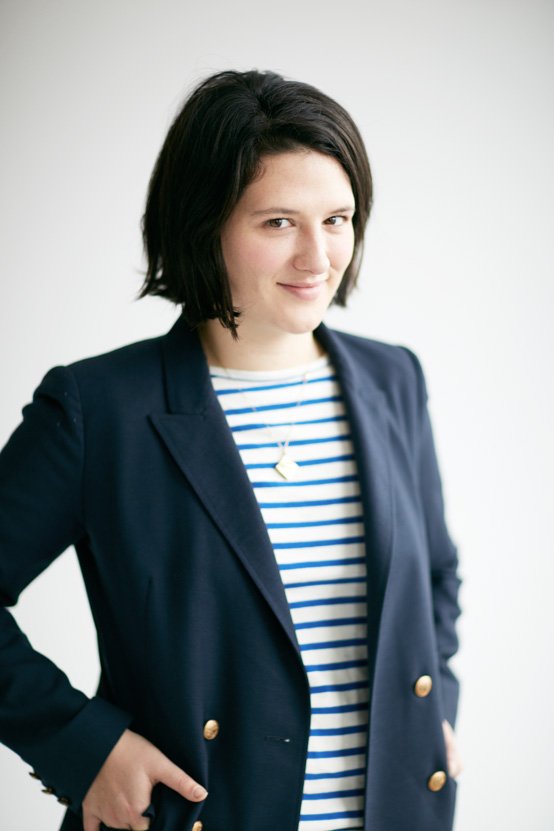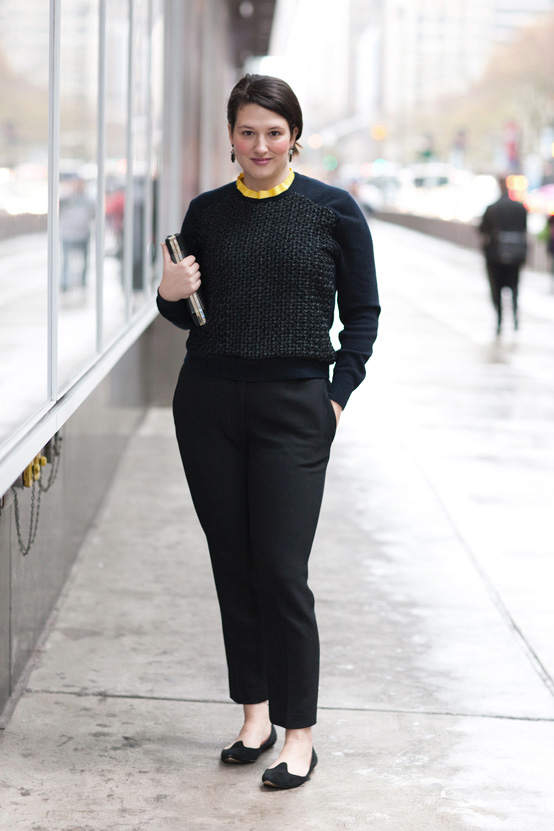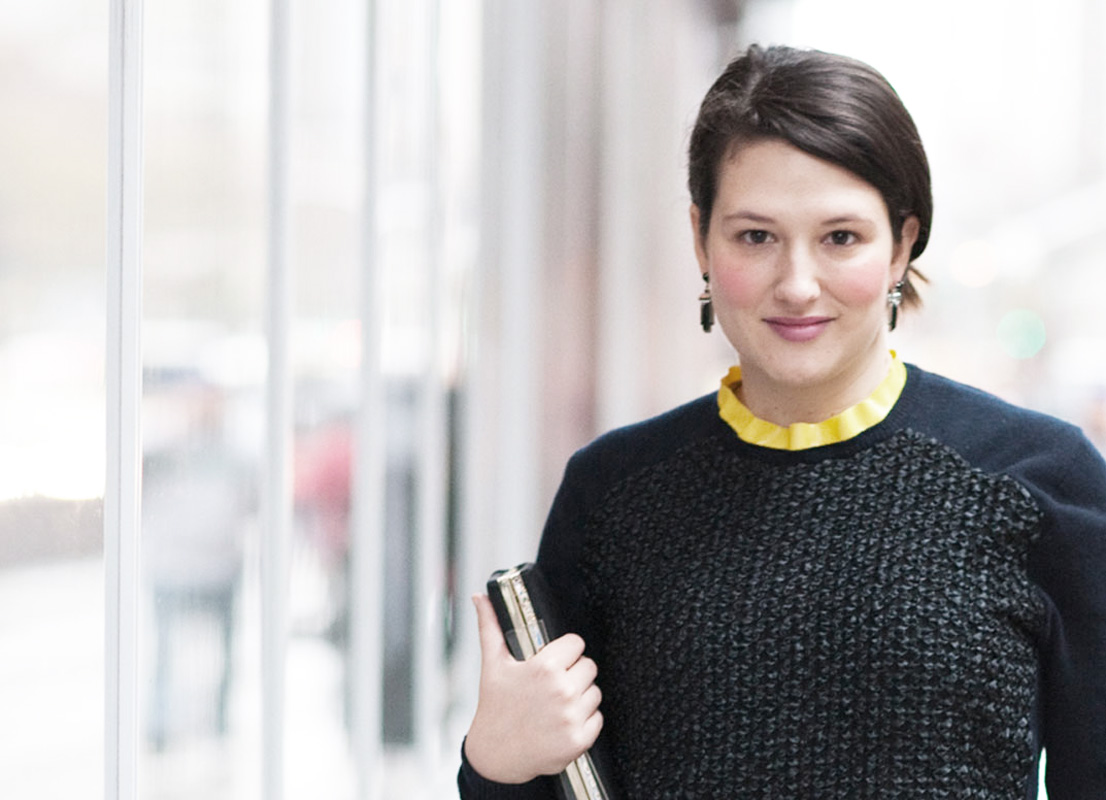 There are a handful of writers in the industry who have truly inspired us here at The Lifestyle Edit and Lauren Sherman is one of those people. She got her start as a lifestyle reporter at Forbes.com covering luxury fashion goods and fashion but it was her time at our favourite news site, Fashionista that we fell in love with her commentary.
There are a handful of writers in the industry who have truly inspired us here at The Lifestyle Edit and Lauren Sherman is one of those people. She got her start as a lifestyle reporter at Forbes.com covering luxury fashion goods and fashion but it was her time at our favourite news site, Fashionista that we fell in love with her commentary.
After years enjoying her thoughtful insights on the changes in the fashion industry and her candid dispatches from fashion week but in 2011, she jumped ship and joined Lucky, as it’s executive online editor, a role that saw her triple the magazine’s online traffic in less than a year.
In 2013 she decided to go freelance, penning an honest account about her decision on Fashionista, where she currently holds the role of editor-at-large, and while we might not be treated to as much of her reporting on the site as we used to, Sherman is now bringing her unique voice and fashion commentary to a whole new string of publications including Elle.com, Style.com and the Business of Fashion.
We recently caught up with her where told us all about her decision to go freelance, why she thinks we need formal mentorship in the industry, the lessons she’s learnt on the job and why being nice in fashion goes a long way.
When I was little I wanted to be a journalist much like kids want to be an actress or a baseball player. I just never grew out of it. The fashion part happened when I was 10 or 11 and bought my first issue of Sassy. That’s when I realised how important clothes were to me. And then, I realised I could write about them for a living.
I wish I had taken more journalism ethics, policy and reporting classes in college and less actual writing classes. Good writing comes out of practice; the more you do it the better you get. Reporting the right way takes a lot of discipline and skill. I was lucky enough to get a lot of on-the-job training, but I don’t think many people do these days. I moved to London to take a job at Quintessentially after interning there while I was studying. The economy was okay in 2004 but most of my friends still didn’t work for a year or so, at least anywhere full time, so I was lucky to get a job straight out of school.
Returning to America after being in London was really hard. At Quintessentially I worked with execs that had lots of connections and knew a lot of fancy people. I thought someone would recommend me for a glossy job and that would be it but it was much harder than that. When I moved to New York I was 23 and I promised myself that I would keep trying to get a staff job until I was 27. If it didn’t happen by 27, I’d do something else but fortunately it happened pretty quickly. I arrived in New York in September 2005 and was hired at Forbes.com in the December. For those few months before I got the job, I kept writing for Quintessentially, and I temped at an agency that represents high-profile speakers. They were great – they let me go on interviews during work hours, but also kept me busy enough to pay my rent.
I’m not great at networking but I also made a point to take a Media Bistro class on fashion and beauty writing that fall – I paid for it with my tax refund from the UK. It was great because the teacher helped me with my resume and gave me quite a lot of advice. I also met Nola Weinstein, who is now the editor-in-chief of Glam.com. She was one of my first friends in the business.
I never planned to work in digital. In fashion publishing, Style.com existed when I graduated, and that was it. Every other magazine website was just a vehicle for driving subscription sales. As for blogs and bloggers, I think Bryan Boy was still on Live Journal at that point. When I started working at Forbes, I realised that you could reach lots of people on the web and still do good writing and reporting. I loved working in a newsroom with other journalists covering different beats. I never had any ambitions to work at a newspaper, but when I was in that environment I realised that daily news was just much more my speed. I didn’t like harping on headlines or rewriting things 25 times. I like saying something interesting and that’s what the web encourages.
Working at Forbes really shaped my career. I was trained there and I took what every one of the senior editors taught me to heart. Jim Michaels, the legendary former editor, came into the newsroom one day and spent a lot of that time discussing how Forbes writers are the theatre critics of business. Today, people talk a lot about how more straight-laced publications need to have a point of view, to do more analysis, but that was always a part of the job at Forbes. I think that’s why it was so easy for me to transition into blogging. I left Forbes in October 2009. I thought I would settle into freelancing – I really wanted to do more straight fashion stories – but there were two websites that I loved and wanted to work for: Racked and Fashionista. Right after I left , I started a blog called the Fashion Beat, where I posted stories I wanted to read. The guys who were running Breaking Media at the time noticed it and asked me if I wanted to come over to Fashionista to write similar stuff. I started there in January 2010.
I decided to leave Fashionista to take the role of online editor at Lucky for a mix of things: First, I was feeling burnout: writing five, six, seven, ten posts a day, plus managing stuff, going to events and doing at least a little bit of reporting is just not sustainable for more than a few years, at least not for me. Secondly, I’d been a Lucky reader from day one and I was always really frustrated by what it looked like on the web. I had a real affinity for it and cared about it and I don’t feel that way about many other magazines in that building. And finally, I was attracted to working for Condé Nast. I had been writing about this company for so long and I really wanted to see how it was run from the inside. I figured, even if I hate this job, it’ll be good for me when I’m out and reporting on the company again.
Building traffic is the easy part of what I do. It’s just about writing stuff people want to read, mixing click-y headlines with in-depth stories. Managing expectations of those above you is the hard part. I’ve never really worked at a place where I was living and dying by traffic or maybe I was but I just chose to ignore the pressure. I think a lot of execs just don’t get that eyes aren’t the most important things; it’s how much money those eyes have to spend. I’d much rather have a smaller audience with a higher income. These days, execs want big audiences with big incomes and that kind of growth is just impossible to sustain.
I think the older you get, the more strategic you have to be with your career moves. I took the job at Forbes because I needed a job. I took the jobs at Fashionista and Lucky because they were no brainers at those points in my life. But for the last two years I’ve chosen to stick with freelancing because I only want to be doing work that I like doing. Would I love to be able to do that in an office? Yes, but I’m at the point where I don’t have to settle for anything less than what I really want.
I realised at Lucky that I actually didn’t want to be an editor. More so, I didn’t want to deal with admin work. I also realised that I missed writing and reporting on business and marketing stories. I am a geek and that’s the work from which I get the most satisfaction. I hear so many friends and colleagues complaining about their jobs. I always think to myself, ‘You work in fashion, you play with pretty clothes all day! If you don’t like it, leave.’ So I guess my goal with explaining why I decided to leave Lucky in a post on Fashionista was to encourage younger generations to figure out what it is they actually like to do instead of walling in arguably unfounded sorrow.
Unfortunately female industry figures haven’t played as much of a role in my career as I would have liked. It’s hard to find people. When I worked at Forbes, I probably emailed 15 editors asking them to go out for coffee with me and I’m not sure anyone applied. Now, I try and follow Eva Chen’s example and meet with as many people as I can but it’s hard. My heroes are Teri Agins – the Wall Street Journal’s longtime fashion reporter, who I finally got the chance to meet recently – as well as Dana Thomas, Lauren Goldstein Crowe, Booth Moore and Robin Givhan. I only know some of them but I follow and admire their work closely and try to learn from it.
Eva Chen has been a mentor to a lot of us even if she doesn’t realize it and my friends Britt Aboutaleb and Leah Chernikoff – both of whom were my co-editors at Fashionista – are my career support group. We really cheer each other on. I feel incredibly lucky to have them. There’s also Patti Pao, the founder of the beauty line Restorsea. She was a luxury industry consultant when we first met and I used to use her as a source. Over the years, we’ve become great friends and she has been there for me when I’ve made career and life decisions. So yeah, maybe it’s not as dire as I thought but I do wish there was more formal mentoring in this industry.
 Going freelance was a really scary prospect. I saved money for six months before quitting my job at Lucky. I have had it good though. Because I’m experienced and I am also a pretty fast worker, I get commissioned quite a bit and can take on a lot too. I think the most important things to remember are a) the hustle never ends and b) you essentially go from having one or two bosses to have 10 at any given time and some of them you’ve never even met. I try not to take anything personally to just keep trucking but it’s not for everyone. At this point in my life, I’d rather deal with the craziness of freelancing than sit in meetings with marketing people.
Going freelance was a really scary prospect. I saved money for six months before quitting my job at Lucky. I have had it good though. Because I’m experienced and I am also a pretty fast worker, I get commissioned quite a bit and can take on a lot too. I think the most important things to remember are a) the hustle never ends and b) you essentially go from having one or two bosses to have 10 at any given time and some of them you’ve never even met. I try not to take anything personally to just keep trucking but it’s not for everyone. At this point in my life, I’d rather deal with the craziness of freelancing than sit in meetings with marketing people.
I’ve been around for a while so a lot of people know me. I think that helps more than anything when you decide to go freelance. I also try to file clean, easy-to-edit copy that’s on time. The more responsible and responsive you are, the more work you’ll get.
I think being nice and respectful of others goes a long way and that’s harder than it sounds. I also think having self-respect is just as important. There’s a huge difference between self-respect and entitlement, though. Creating strong relationships is just about being nice and respectful of people and talking. It’s really hard for me to talk to people at parties, which I know is hard to believe for people who have worked with me or know me well, but I try to talk to at least a couple. There’s also the matter of not letting people – especially publicists – walk all over you. It’s an ongoing balancing act.
I look for a good voice from new writers but also the ability to say something substantive. If you can turn a beautiful phrase but it doesn’t really mean anything, I get frustrated. I also get very annoyed by superlative language. I want you to use the right word, not the most beautiful word. I always pass out George Orwell’s 5 Rules of Effective Writing. The best advice I have to for writers as far as developing their writing style is concerned is to be come clear and concise first, then bring your own angle to the story. Your voice will emerge from that. The best journalistic advice I’ve received is that you’re only as good as your last story.
I think there are very few news blogs anymore and honestly, I don’t think there be as many style blogs in five years time. I think news is moving towards big, broader multi-channel websites and person style is moving towards visually driven platforms. The two used to live together and now they are completely separate entities. I would love for someone to start an anonymous blog along the lines of what Fashionista and the Cut were like in the early days, though. I miss the raw, who-gives-a-fuck attitude. It doesn’t really exist anymore.


Thank you lifestyle edit for such an insightful look knto what it takes go be a good writer. I feel people keep these kind of things close to their chest, and will be taking away everything Lauren has said